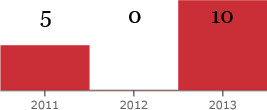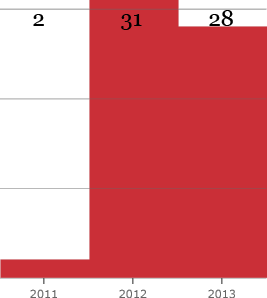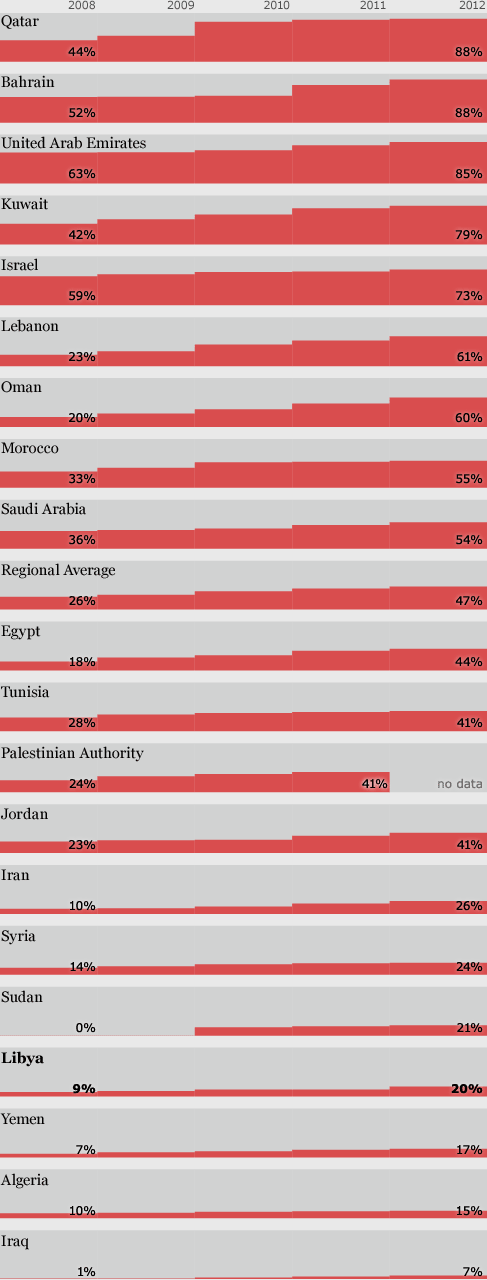As Libya’s growing media sector faced threats from state and non-state actors alike, the country continued to struggle to realize the promise of the 2011 revolution. Several journalists were physically assaulted by security guards outside the General National Congress (GNC) in February. The same month, the government confirmed the appointment of the country’s first minister of information since the Qaddafi era, which made some journalists fear the government intended to assert greater control over the media. But the greatest threats to journalists came from the government’s inability to protect them. At least eight journalists were briefly abducted in 2013, while raids on news outlets and attacks on reporters continued. No journalists were imprisoned in late year, but the government continued to pursue a case against an editor who was accused of insulting the judiciary. At least one journalist was killed for his work this year, after no journalists were killed for their work in 2012.
Libya
» The government remains unwilling or unable to rein in militias threatening the press.
» Journalists assaulted, abducted; news outlets raided.
As Libya’s growing media sector faced threats from state and non-state actors alike, the country continued to struggle to realize the promise of the 2011 revolution. Several journalists were physically assaulted by security guards outside the General National Congress (GNC) in February. The same month, the government confirmed the appointment of the country’s first minister of information since the Qaddafi era, which made some journalists fear the government intended to assert greater control over the media. But the greatest threats to journalists came from the government’s inability to protect them. At least eight journalists were briefly abducted in 2013, while raids on news outlets and attacks on reporters continued. No journalists were imprisoned in late year, but the government continued to pursue a case against an editor who was accused of insulting the judiciary. At least one journalist was killed for his work this year, after no journalists were killed for their work in 2012.
At least one journalist was killed in relation to his work in Libya in 2013. Saleh Ayyad Hafyana, a photographer for the independent Fassato News Agency, was killed by shrapnel on November 18 in Tripoli. Members of a militia had opened fire on a crowd of protesters who were demonstrating against the militias' presence in the capital.
Bahrain |  |
Egypt |  |
Iran |  |
Iraq |  |
Israel and the Occupied Palestinian Territory |  |
Libya |  |
Syria |  |
Tunisia |  |
Yemen |  |
A general environment of insecurity posed a significant threat to journalists this year. In one week alone, armed men temporarily abducted three journalists.
Youssef Qarqoum
Reporter for Libya First Channel, was abducted and tortured for three days by unidentified men in Benghazi on April 22, according to news reports. The men threatened to kill him and his family and accused him of supporting Qaddafi.Hassan al-Bacouche
Correspondent for Free Libyan TV, was kidnapped in Benghazi on April 29 and beaten for two hours by a group of unidentified armed men, according to his testimony on Free Libyan TV. "They accused me and all journalists of destroying the country," he said.Mahmoud al-Firgany
Correspondent for Al-Arabiya TV in Tripoli, was abducted on April 29 and held in the Ministry of Foreign Affairs building for seven hours, according to news reports. The journalist was covering the siege of the government building by armed men who questioned the journalist about his purported loyalty to Qaddafi.In April, CPJ documented the second anniversary of the deaths of freelance photographers Tim Hetherington and Chris Hondros in Libya. The journalists were killed in Misrata by mortar rounds from government forces. Hondros lost consciousness almost immediately, while Hetherington bled out in the back of a pick-up truck as he clutched the hand of a Spanish photographer.
Libya ranks fourth worst in the Middle East and North Africa for Internet penetration, with only 20 percent of Libyans using the Internet, according to 2012 statistics published by the International Telecommunication Union.

